Part 7: The Great Coffeyville Raid
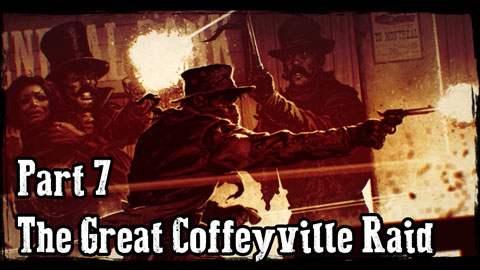
Unlike the previous stories, this time the saloon audience also chimes in and offer us their versions of what happened.
I’ve added an additional ‘nugget’, a newspaper article from “The Helena Independent” that relates the events in Coffeyville, 5 October 1892. It’s a bit long but worth it if you have some time. I’ve found a few other articles, such as from the “Daily Indian Chieftain”, but this one was more fun to read; it feels a bit like the Helena Independent was that time’s Daily Mail just making half the news up.
Concept Art
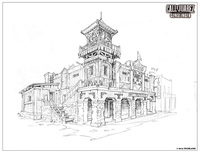

Nuggets of Truth
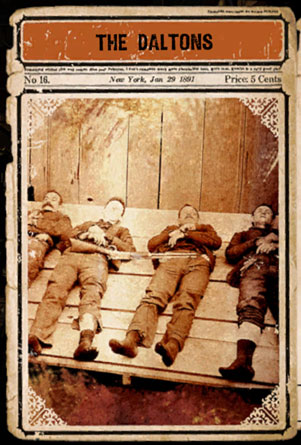
Related to the famous Youngers, the Dalton brothers, Gratton, Bob and Emmett, gave up their jobs as lawmen in the 1890s to form the so-called Dalton Gang. The sole purpose of their enterprise was to rob trains and banks and make a hell of a lot more money than they ever did as peace officers. They also coveted a bit of the notoriety their more famous cousins enjoyed as members of the James Gang. One such robbery ended with the arrest of Grat who then managed to astonish the marshals who had him in custody by escaping from a moving train. Grat stole a key to his chains from a napping guard then jumped through the window right into a river while the train was passing over a bridge.
The Daltons weren't always so lucky. One of them, Bob, desperate to make a reputation as an outlaw that would surpass that of Jesse James, suggested an incredibly daring plan. He wanted to rob two banks at the same time, in broad daylight. On October 5, 1892, the brothers rode into Coffeyville, their hometown. They hid behind fake beards and attempted to do what no outlaw had done before. Their bold plan ended in complete disaster for the brothers and their comrades in arms. Bob died that day and his brother Emmett, shot twenty-three times, miraculously lived, went to prison, and was later pardoned. He died in Hollywood in 1937, after trying his hand at being an actor, an author, and a real estate agent.
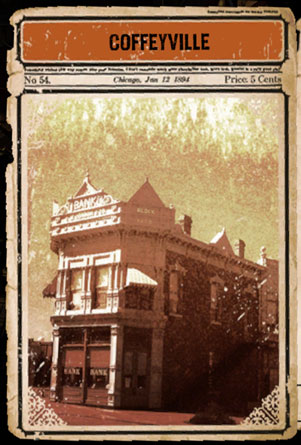
On October 5, 1892, the Dalton Gang appeared in their hometown of Coffeyville, Kansas. Their plan was to rob two banks at the same time. Their targets were C.M. Condon & Company's Bank and First National Bank, located across the street from one another. Brothers Bob, Grat, and Emmett, and their compadres, Dick Broadwell and Bill Power, split into two groups. Wearing false beards, they showed up at both banks when they opened, planning to pull off a quick double heist. One of the groups robbed their bank without incident, but the other was outfoxed by a brave bank employee who convinced the bandits that the safe was protected with a time lock, which wouldn't open for another ten minutes.
They waited for it to open and in that time the entire town rallied against them. The citizens of Coffeyville recognized the brothers in spite of their less than clever disguises and had no intention of letting them escape with the money.
A bloody gunfight broke out in the streets of Coffeyville and the entire gang was killed, except for the youngest Dalton, Emmett, who was shot twenty-three times. He was sentenced to life in prison, but was released after 14 years. He would often say it was a U.S. Marshall, Heck Thomas, who pushed the Daltons into attempting that crazy plan by tracking them so relentlessly. The Coffeyville robbery was supposed to be the gang's ticket out of a life of crime, instead it was a ticket to the cemetery for most of them.
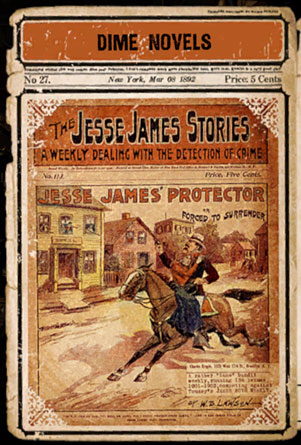
The term originated with the first book in the Beadle and Adams Dime Novel series, "Malaeska, the Indian Wise of the White Hunter", by Ann S. Stephens, dated June 9, 1860. The series ran for 321 issues and established all the conventions of the genre. From the lurid woodblock print covers to the melodramatic and sensational stories, they were popular among young, working-class audiences, mostly owing to the increased literacy rate of society in general at the time.
They told all sorts of outlandish tales, usually in a Western setting. Their style was simple and accessible, the characters were one-dimensional, but they were page turners and a forerunner of modern day mass-printed paperbacks and comic books. They turned many real characters of the day, outlaws and lawmen alike, into celebrities of sorts. They helped create the modern romanticized mythology of the Wild West that continues on in Hollywood westerns and TV shows to this very day.
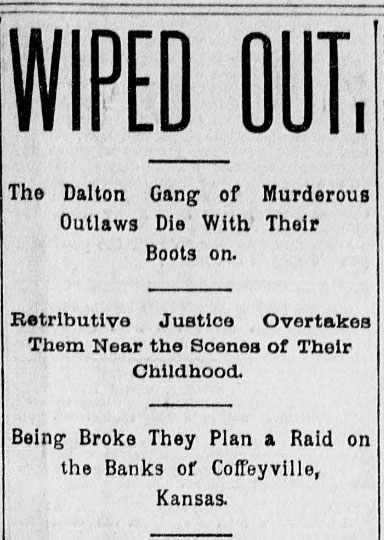
Additional nugget. News article from the front page of ‘The Helena Independent’, October 06, 1892. The first sentences are all a bunch of headlines in a manner of summary.
WIPED OUT,
The Dalton Gang of Murderous Outlaws Die With Their Boots on.
Retributive Justice Overtakes Them Near the Scenes of Their Childhood.
Being Broke They Plan a Raid on the Banks of Coffeyville, Kansas.
The Alarm Given and the Robbers Surrounded by Armed Citizens.
In the Fight Ensuing Four of the Outlaws Fall Dead - As Many of the Posse Killed.
Coffeyville, Kan., Oct. 5. - The Dalton gang has been exterminated, wiped off the face of the earth. Caught like rats in a trap, they were to-day shot down, but not until four citizens of this place yielded up their lives in the work of extermination. Six of the gang rode into town this morning and robbed the two banks of the place. Their raid had become known to the officers of the law, and when the bandits attempted to escape they were attacked by the marshal's posse. In the battle which ensued four desperadoes were killed outright, and one so badly wounded that he has since died. The other escaped but is being hotly pursued. Of the attacking party four were killed, one fatally and two seriously wounded. The dead are: Bob Dalton, desperado; Grattan Dalton, desperado; Emmet Dalton, desperado; Joseph Evans, desperado; John Moore, "Texas Jack," desperado; T. C. Connelly, city marshal; L. M. Baldwin, bank clerk; G. W. Cubine, merchant; C. J. Brown, shoemaker. The wounded are: Thos. G. Ayres, cashier of the First National bank, shot through the groin and cannot live; T. A. Reynolds, wounded in the right breast; Lois Detz, shot in the right side.
It was rumored a month ago that the Dalton gang was contemplating a raid upon the banks of this city and arragements were made to give them a warm reception, but the excitement finally died away and the street patrol was given up. About 10 o'clock this morning the gang rode into town. They came in two squads of three each, and passing through unfrequented streets rendezvoused in an alley in the rear of the First National bank. Robert Dalton, the notorious leader, and Emmett, his brother, went to the First National bank. The other four, under the leadership of Texas Jack, or John Moore, went to the private bank of C. M. Congdon & Co. In the meantime the alarm had been given. The Dalton brothers were born and bred in this city and had been recognized. City Marshal Connelly was quickly notified and began collecting a posse. While the marshal was collecting his forces the bandits, all ignorant of the trap, were proceeding deliberately with the work of robbing the banks. Texas Jack's band entered Congdon's bank and with Winchesters levelled at Cashier Ball and Teller Carpenter demanded that the safe be opened. The cashier explained that the safe door was controlled by a time look and could not be opened for about twenty minutes, at 10 o'clock. "We'll wait," said the leader, and he sat down at the cashier's desk, first gathering up the money in the cash drawers.
Bob and Emmett Dalton, in the meanwhile, were having better luck at the First National bank. When they entered the bank, they found Cashier Ayres, his son Albert Ayres, and Teller W. H. Sheppard. None of them were armed and with levelled revolvers the brother bandits easily intimidated them. Albert Ayres and Teller Shepard were kept under the muzzles of Emmett Dalton's revolvers, while Bob Dalton forced Cashier Ayres to strip the safe vault and cash drawers of all the money and place it in a sack. Fearing to leave them behind, lest they should give the alarm too soon, the desperadoes marched the officers of the bank out of the door with the intention of keeping them under guard while they made their escape. The party made their appearance at the door just as Liveryman Spears and others of the marshal's posse took positions in the square. When the Dalton brothers saw armed men in the square they appreciated their peril on the instant and leaving the bank officers on the steps of the bank building ran for their horses. As soon as they reached the sidewalk Spears' rifle quickly came into position. An instant later it spoke and Bob Dalton, notorious leader of the notorious gang, fell dead. Emmett Dalton had the start of his brother, and before Spears could draw a bead on him had dodged behind the corner of the bank and was making time in the direction of the alley where the horses were tied.
The shot which dropped Bob Dalton aroused Texas Jack's band in Congdon's bank. Running to the window they saw their leader prostrate on the ground. Raising their rifles they fired one volley out of the windows. Cashier Ayres fell on the steps of the bank shot through the groin. Shoemaker Brown, of the attacking party in the square, was shot through the body and died in a few minutes. The firing attracted the attention of Marshal Connelly who was collecting more men for his posse, and with the few he had already gathered, he ran hurriedly to the scene of conflict.
After firing the volley from the window, the bandits, appreciating that their only safety lay in flight, attempted to escape. They ran from the door of the bank, firing as they fled. The marshal's posse in the square, without organization of any kind, fired at the fleeing bandits, each man for himself. Spears' trusty Winchester spoke twice more in quick succession before the others of the posse could take aim, and Joseph Evans and Texas Jack both fell dead, shot through the head, making three dead bandits to his credit.
In the general fusilade Grattan Dalton, one of the two surviving members of the Texas Jack squad, Marshal Connelly, Geo. Cubine and M. Baldwin, one of Congdon’s bank clerks, were mortally hit and died on the field. Allie Ogee, only survivor of the band, was successful in escaping to the alley where the horses were tied, and mounting the swiftest of the lot, fled south in the direction of the Indian Territory. Emmett Dalton, who escaped from the First National bank, had already reached the alley in safety, but had some trouble in getting mounted. Several of the posse quickly mounted and pursued the escaping bandits.
Emmett Dalton's horse was no match for the fresher animals of his pursuers. As they closed on him he turned suddenly and fired upon the would-be captors. The latter answered with a volley, and Emmett toppled from his horse, hit hard. He was brought back to town, and died late this afternoon. He made an ante-mortem statement confessing to various crimes committed by the gang. Allie Ogee is still at large.
[The next few paragraphs are less interesting and I’ve skipped them to continue with: ]
THEY WERE ALL BROKE.
And Made the Fatal Raid to Replenish Their Purses.
COFFEYVILLE. Oct. 5.-Emmett Dalton was not dead at a late hour. He was slowly dying in a room in the hotel here, and his death is expected any moment. Indignation against the robbers was so intense this afternoon that the citizens wanted to lynch the dying bandit. To prevent this the coroner gave out that he was already dead. Up to 11 o'clock to-night Allie Ogee had not been captured.
Last night an Associated press representative had a talk with Emmett Dalton. He declared that the stories of hidden treasure were all nonsense. "If there had been any hidden treasure," he said. "we would all be alive to-day. It was because we were all broke that we planned the Coffeyville raid. We were being hard pressed down in the territory and Bob decided that we would have to get out of the country. He planned the robbery about two weeks ago while we were in Osage county. We tried to persuade him not to do it, and then he called us cowards. That settled it, and we started."
It was with great difficulty the bandit told the story, as he was suffering terribly from a wound in the side. The physician says he cannot possibly survive. Cashier Ayres is resting easier to-night.